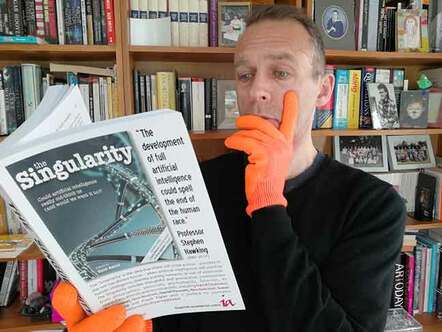This article is more than 1 year old
'No' does not mean 'yes'... unless you are a scriptwriter for software user interfaces
The circle is complete. Now I am the master… er, I mean 'the source'
Something for the Weekend, Sir? "Let me be absolutely clear about this…" As soon as you hear these words, you know the rest of the sentence will be evasive, meandering, and vague.
Language is an amusing and infuriating kludge of ambiguity. Getting yourself understood within the IT industry is a particular challenge. Even everyday desktop interactions with software requires a big conceptual leap of faith into a universe of virtual proxy objects associated via increasingly freaky nomenclature.
Files? Folders? They're not really there, but OK, we can pretend. Easy. Then, quite out of the blue, we get crazy stuff such as Volumes, Clouds, Signals and Platforms. I hate to break it to you but these words do not conjure the same concepts in the minds of ordinary, sane people as they apparently do with IT people.
For example, it makes perfect logical sense to an IT person interested in cryptocurrency investment to track how long it will take Bitcoin to travel 384,400km into space. For every dollar increase in exchange value, the world's favourite crapto gets a kilometre closer to the Moon.
What, wait… the Moon? Er, what for? Oh, you silly fellows, it's obvious! As the website proclaims: "Crypto going to the moon has been a dream for many crypto hodlers (sic) since the inception."
Nope, that sentence means nothing to me, either. It might explain Elon Musk's newfound interest in the subject. Perhaps one of you incepted hodlers out there can help me out as I'm baffled. It's enough to drive me to drnik. Mine's a gass of scoth, please.
![[Thinks] I must make sure I spell 'whisky' correctly. Loch Lomond Whisky poster with spelling mistake](https://regmedia.co.uk/2021/03/11/loch-lomond-whisky-poster.jpg)
Writing as someone who works a bit with words, I believe the appropriate choice of words is important to convey not just meaning but intention. Back in my old magazine sub-editing classes, the discussion would inevitably wander towards those perennially annoying points of English-language pedantry such as when to use the word "fewer" instead of the word "less". The prevailing point of view argued that most people don't know the difference and even those who do will immediately understand what you mean anyway. Insisting on making an issue of it is therefore unnecessarily divisive.
My counter-argument was that those people who do know the difference notice the error. Pedants get annoyed; literate readers assume you are lazy. By using inappropriate terms or words used incorrectly, you alienate these people and lose them as readers. But by using the right words, everyone is content and you keep all your readers. Therefore making the effort to get it right is, by definition, more inclusive.
Of course, if a fundamental lack of vocabulary is the problem, use icons instead.
This week Adobe released new versions of its video editing and motion graphics applications Premiere Pro and After Effects. Both updated programs have ditched certain terminology from its user interface that were considered gender-specific. Master Styles are now just called Styles, for example, and Master Clips have been renamed Source Clips. It is likely that the company will roll out equivalent UI changes in its other software products this year.
There will always be wags who think it hilarious to claim we will be forced to rename menus as persons-us. Those persons – all of them men, by the way – just need to grow up a bit. Surely you've noticed there is a general movement in the IT industry to rethink some of its use of old-fashioned terminology. Hence browsers, ad-blockers and antivirus software are ditching blacklist and whitelist in favour of uncontentious alternatives such as blocklist and allow list.
I happen to support this movement. Language changes over time and it helps when the change is deliberate. Hence we modern types get to choose between Dark mode and Light mode interfaces. No doubt the objectors would prefer something more traditional, such as Coal Shed mode and Candelabra mode. These types probably spell "today" as "to-day" and pepper their conversation with phrases such as "my good fellow". Oh I am bored with running my software in Misery mode, they'll cry, I much prefer Gay mode.
Personally, I would like to extend this movement to make all use of words in UIs more inclusive. User-facing notifications could use plainer language. For example, Yes/No/Cancel buttons in dialog windows could be reworded more honestly as:
- [YES] —> [YES]
- [NO] —> [NO BUT YOU WILL ASK ME AGAIN LATER REPEATEDLY UNTIL I CLICK YES]
- [CANCEL] —> [YOU WILL DO IT ANYWAY WHEN I'M NOT LOOKING]
Messages about how browser cookies are used could change too. Instead of the obscure Functional only. For basic operation of this website, the message could make it easier to understand, thus: This cookie will record every click in perpetuity and intrusively track every metadata concerning your existence right down to the roots of your pubes.
My personal pet hate is the About [app name] menu command found in every software product. This is long overdue an overhaul in terminology. It should be phrased to say: Show a diddy little rectangle containing our company logo, the current year in case you have forgotten it (useful for time-travellers and dementia sufferers) and some names of people who work here, but absolutely fuckity-wank-all about the app.
Words are important, right?



